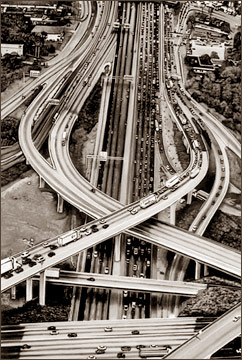National development in a global context
 Development or underdevelopment has never been an entirely local
affair. For the development trajectory of any country has been shaped by
its external relations to varying degrees. As is will known, colonialism
was a critical influence on the colonies of western powers over several
countries. Development or underdevelopment has never been an entirely local
affair. For the development trajectory of any country has been shaped by
its external relations to varying degrees. As is will known, colonialism
was a critical influence on the colonies of western powers over several
countries.
On the other hand, developments in post-colonial societies over the
last half a century or so have been shaped as much by the colonial
legacy as by the domestic policies adopted by successive
post-independence governments.
Consequently, in spite of colonial experience, some countries have
overcome obstacles to development and emerged as developed nations,
while others have stagnated or declined in terms of socio economic
development and political stability, said Prof. S. T. Hettige, Professor
of Sociology, University of Colombo.
|

Prof. Hettige |
The critical importance of domestic policy environment cannot be
over-emphasised though the changing external environment can either
facilitate or hinder the process of socio-economic development. We all
remember the impact of the first oil shock on developing countries in
the early 1970’s. The current oil crisis which is much worse continues
to have a devastating impact on net oil importing developing countries
like Sri Lanka.
Individual countries cannot shape the global economic environment,
though large countries like the USA, India and China have a significant
influence on it. So, most countries are compelled to adopt the changing
external environment. The most effective way to adapt is to adopt
rational policies in diverse sectors.
The failure to adopt appropriate policies can drastically reduce the
capacity of countries to cope with the changing external environment.
On the other hand, policy development cannot be a “peace meal”
exercise as long term development prospects of a country depend on
evidence-based national planning on a sustained basis. Moreover,
planning should not be confused with political decision-making.
For many planning decisions need to be based on a technical or
scientific basis. This is however possible only if various professions
in a country are encouraged to evolve and develop in an autonomous
manner. Developed, modern societies are highly differentiated due to the
autonomous development of professions and increasing specialisation.
In an increasingly integrated world, the competitiveness of a country
depends on the degree of professionalisation of various functions. For
instance, highly professionally managed universities attract students
and staff from other countries.
|

Networks of super highways |
Similarly, an efficient and professionally-oriented state bureaucracy
attracts foreign investment to the country as doing business is
convenient in such an environment. As is well known, a highly
professional foreign service guided by talented and experienced
diplomats is an asset to any country that depends heavily on external
trade and other external relations for its development and stability.
The development of professionalism depends a great deal on the
relative autonomy that different sectors and professions enjoy. It is
also important that different professions also maintain high ethical
standards and professional practices that are universally accepted. On
the other hand, this is possible only when the most qualified and
talented persons are elevated to high positions in various institutions.
If mediocre people find their way up on the basis of social and
political capital, professions and institutions can degenerate over
time. Such a development can seriously undermine development prospects
of a country.
Development is a cumulative process. It cannot be achieved quickly.
Some countries have achieved development over several decades and this
is as fast as any country can achieve a high level of development.
However, such countries have followed consistent policies over time
to facilitate the development process. One such policy has been a
sustained commitment to high professional standards and autonomy of
institutions. High levels of public investment in human resource
development have often given expression to the above commitment.
All human societies are hierarchical to varying digress. However, in
modern societies, the hierarchy of privilege by and large coincides with
the hierarchy of merit. In other words, the distribution of material and
social rewards in society broadly corresponds to the distribution of
merit.
Those who enjoy privileges have to justify or legitimize their
privileges. When this does not happen, underprivileged groups tend to
consider society as unjust. The result is unrest, lawlessness and the
decline of morale.
This is not an environment conducive for economic and social
development due to several reasons. Firstly, in a country that does not
take merit seriously, many youngsters do not have the motivation to
remain there and contribute to national development.
Secondly, vital sectors cannot be fully developed due to
mismanagement and scarcity of talented persons. Thirdly, efficiency and
productivity and quality of work can suffer when workers are not
motivated due to unfair distribution of wealth and other social rewards.
Finally, mass exodus of labour due to relatively unfavourable working
and living conditions can adversely affect the vital sectors of the
domestic economy such as food production and export-oriented industries. |
